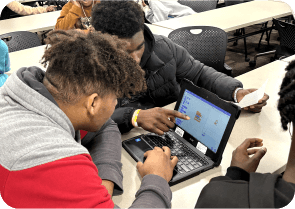
When mentoring African American high school students, it’s essential to be culturally sensitive, understand their unique challenges, and provide support that addresses their needs. Here are some specific considerations for effectively mentoring African American high school students:
Cultural Competence:
- Take the time to educate yourself about African Americans’ cultural background and history.
- Be aware of the impact of systemic racism and discrimination and how it may affect the student’s experiences
Establish Trust:
- Building trust is crucial. Understand and respect the student’s experiences and perspectives.
- Create a safe, non-judgmental space where students feel comfortable sharing their thoughts and concerns.
Cultural Relevance:
- Incorporate culturally relevant materials and examples into your mentoring sessions.
- Connect academic and career advice to the student’s cultural background and interests.
Addressing Stereotypes:
- Discuss and challenge stereotypes that the student may encounter. Help them develop strategies to navigate and overcome biases.
- Encourage positive self-identity and pride in their cultural heritage.
Promoting Academic Success:
- Offer support in academics, emphasizing the importance of education as a tool for empowerment.
- Help the student set academic goals and develop strategies for success.
College and Career Guidance:
- Provide information about college and career opportunities, emphasizing the value of higher education.
- Assist with the college application process and explore scholarship opportunities.
Mentorship as a Two-Way Street:
- Recognize that mentorship is a mutual learning experience. Be open to learning from the student’s experiences and perspectives.
- Share your experiences and insights, fostering a sense of shared understanding.
Encourage Extracurricular Involvement:
- Highlight the importance of participating in extracurricular activities as a way to develop skills, build a resume, and form connections.
- Identify clubs or organizations that align with the student’s interests.
Coping with Discrimination:
- Discuss strategies for coping with discrimination and navigating challenging situations.
- Help the student develop resilience and self-advocacy skills.
Cultural Celebrations:
- Acknowledge and celebrate cultural events, holidays, and achievements within the African American community.
- Incorporate culturally relevant celebrations into your mentoring relationship.
Family and Community Involvement:
- Recognize the importance of family and community support. Encourage the student to involve their family in the educational journey.
- Explore ways to connect with community resources and networks.
Promote Leadership and Empowerment:
- Encourage the development of leadership skills and a sense of empowerment.
- Provide opportunities for the student to take on leadership roles within school or community projects.
Remember that mentoring is a personalized relationship, and understanding the unique experiences and needs of the individual student is crucial. Tailor your approach to their specific situation and foster a mentorship that promotes academic success, personal development, and a strong sense of cultural identity.


